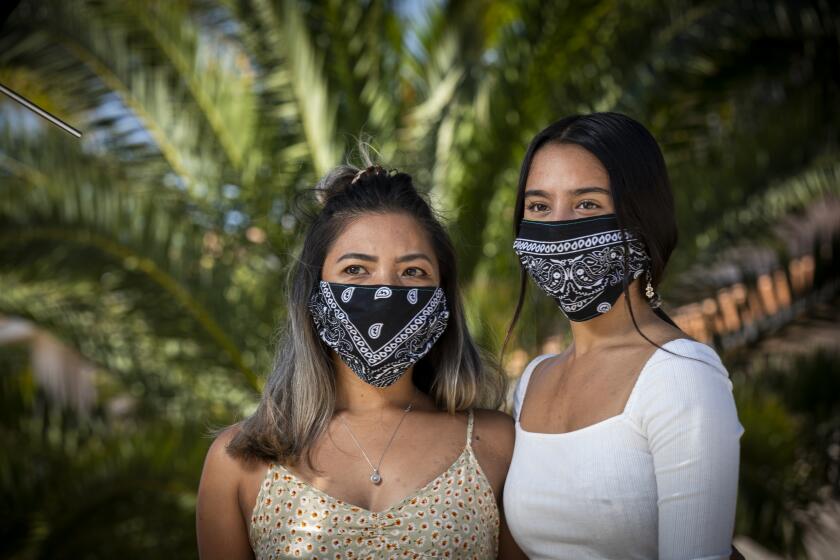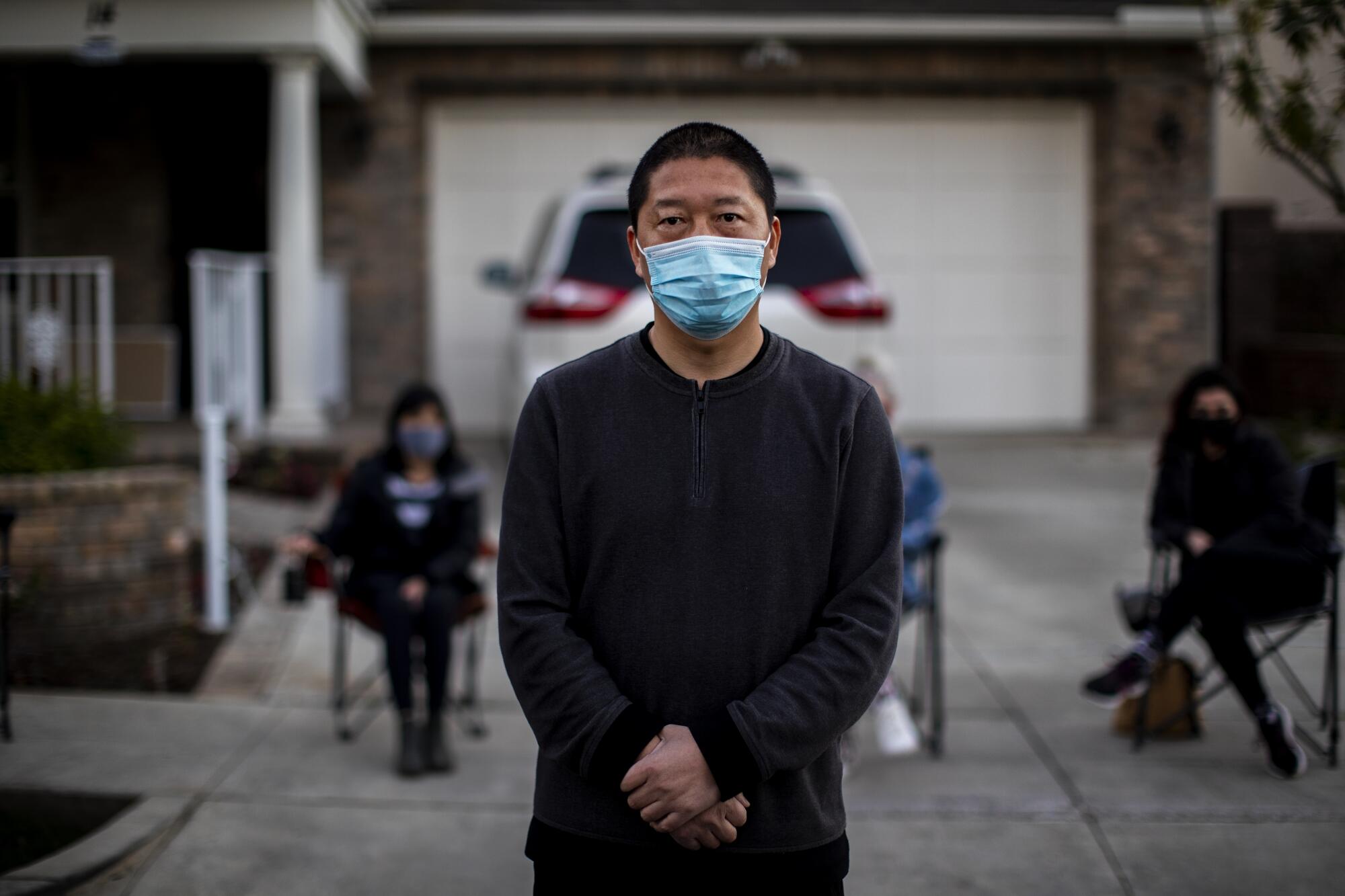
- Share via
Every night, the neighbors converge on the Si family’s two-story home, which has large windows and an expansive porch adorned with columns.
Some sit in camping chairs in front of the driveway. Others keep watch from their cars or patrol the nearby parks.
The Sis moved to this upscale Ladera Ranch neighborhood a few months ago, with the country deep in the COVID-19 pandemic and hate crimes against Asian Americans on the rise.
Almost immediately, teenagers swooped in for nightly visits, repeatedly ringing the doorbell, yelling and pounding on the door.
One told Haijun Si to “go back to your country.” Another called Si’s wife a pejorative slur used to describe a Chinese person. Some threw rocks.
Sometimes, the interruptions came just as the family sat down for dinner.
Other times, Si’s 8-year-old daughter and 5-year-old son were jarred awake at midnight.
Si and his wife took turns standing guard outside. They installed a new fence and cameras. They called the police.
But the attacks kept coming — until their new neighbors stepped in.
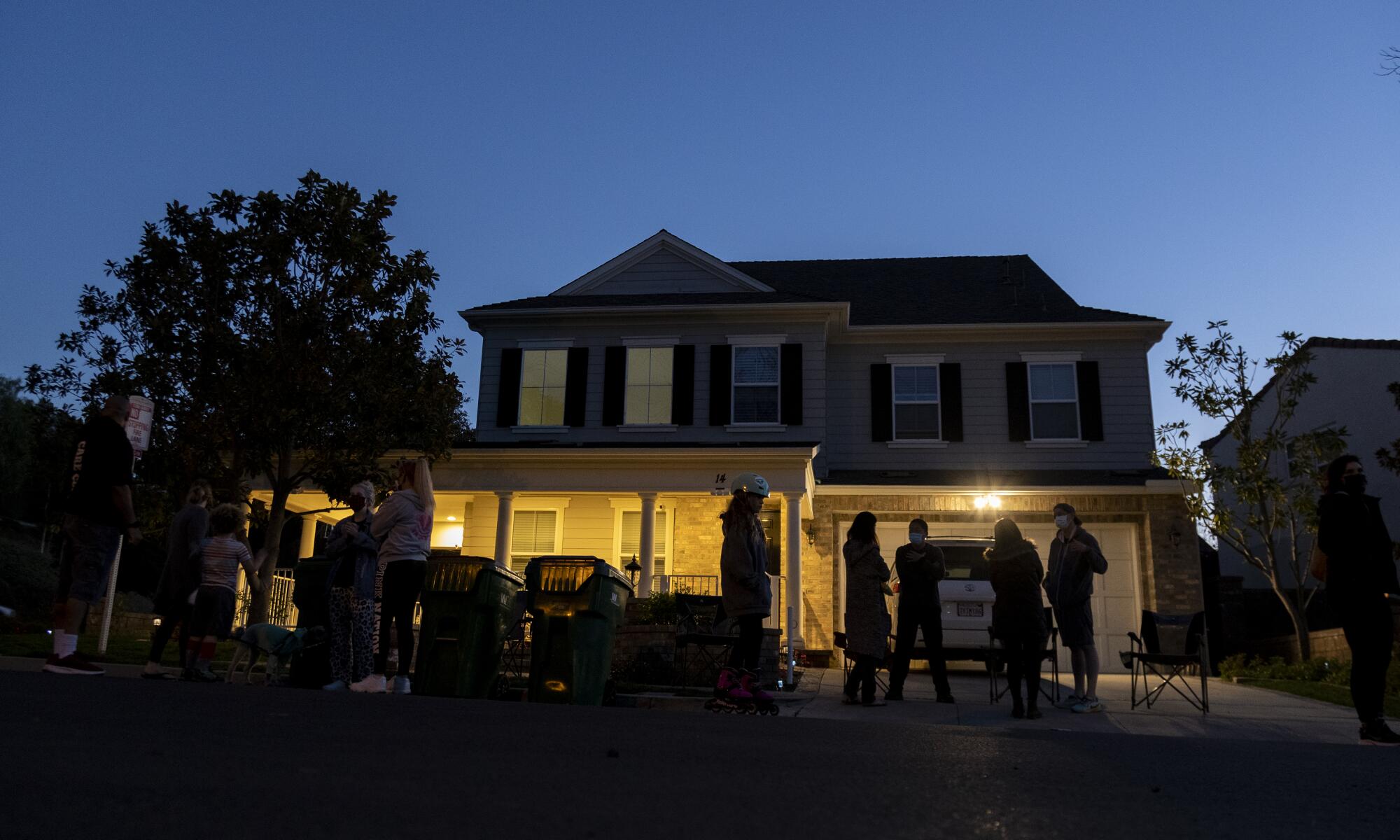
“I did not understand the extent of the harassment and how often it was occurring, at first,” said Layla Parks, who organized the nightly neighborhood watch. “I was immediately outraged and wanted to help.”
Violence and hate incidents directed at Asian Americans have surged across California, including in Orange County, since the beginning of the pandemic, with some blaming Asians because of the coronavirus’ origins in Wuhan, China.
A recent spate of violent attacks in Oakland, San Francisco, New York City and elsewhere has attracted national attention and sparked fear among Asian Americans, though it is not clear whether some of the incidents were racially motivated.
In February in Koreatown, two men hurled anti-Asian slurs at a 27-year-old Korean American U.S. Air Force veteran, calling him “Chinese virus” and then swinging at him, he told KTLA.
“We’re seeing an epidemic of hate right now, and we have to stand together,” state Sen. Dave Min (D-Irvine), who represents the district just west of Ladera Ranch, said last week at an event to show support for the Si family.
While officials in Orange County are still compiling information on reports made in 2020, preliminary statistics indicate a tenfold increase in hate incidents against Asian Americans, said Alison Edwards, chief executive of the nonprofit OC Human Relations.
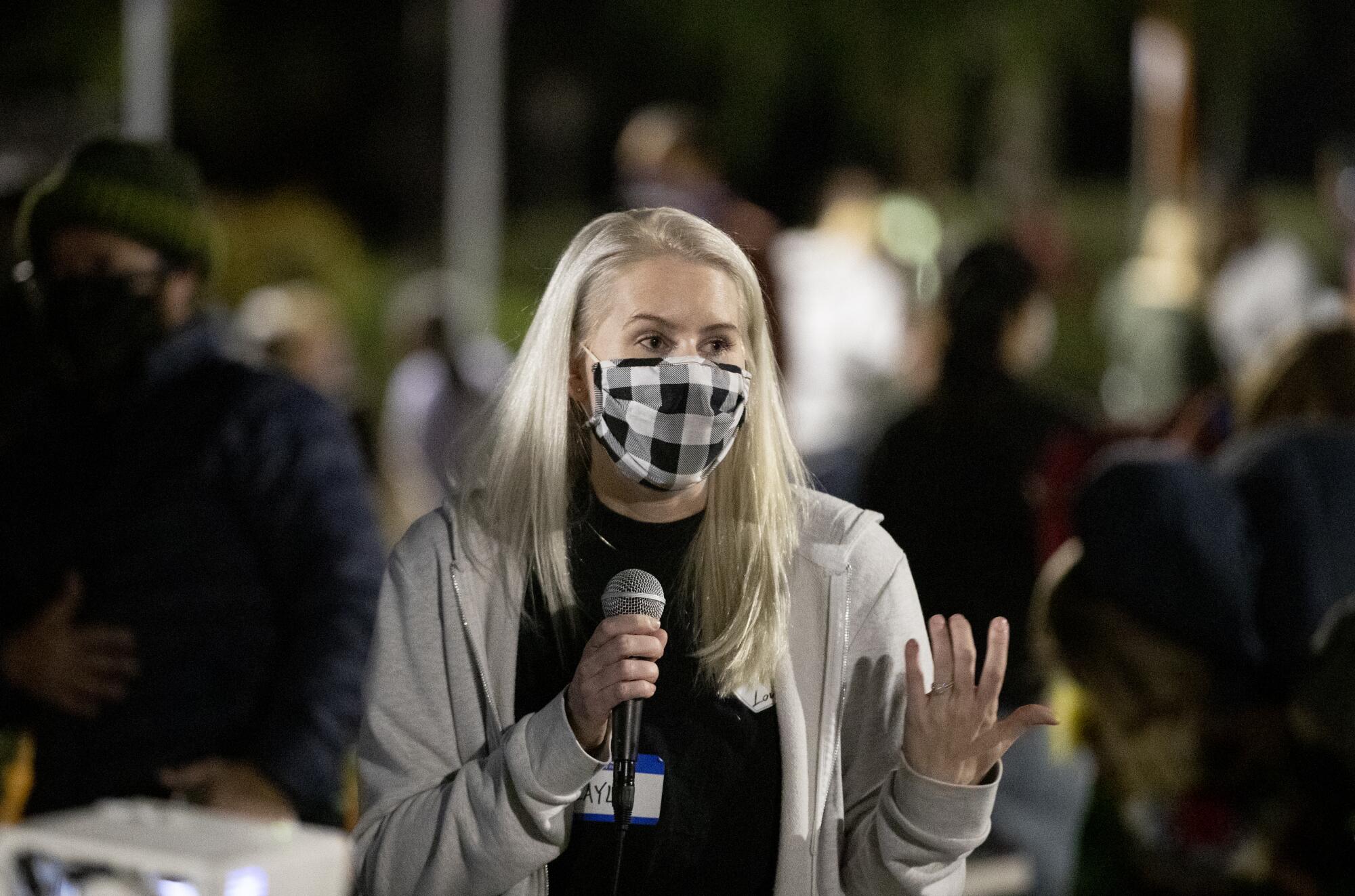
“It makes me physically ill,” said Parks, 30. “This has opened my eyes to the racism that is alive and well in Ladera Ranch.”
It’s a troubling uptick that experts have blamed in part on Donald Trump’s rhetoric about the pandemic, including his use of terms such as “China virus” and “kung flu.”
Last year, California saw a consistent increase in hate incidents and crimes targeting Asian Americans, said Brian Levin, executive director of the Center for the Study of Hate and Extremism at Cal State San Bernardino.
Stereotyping and conspiracy theories identifying Asians as responsible for COVID-19 have been embraced by wide swaths of the country, Levin said, with a new Center for Public Integrity/Ipsos poll showing that nearly 1 in 4 Americans have concerns about being physically near Asian people.
As more Californians report anti-Asian hate incidents, activists push Gov. Gavin Newsom for aid.
A “catalytic event” like the pandemic, with stereotyping by political and social influencers acting as an accelerant, often leads to increased targeting of racial groups, Levin said.
The attacks against the Si family fit another pattern — the homes of minority residents tend to be targeted by neighbors in certain age groups, Levin said.
“The most common offenders of these residential crimes are turf-oriented youths with moderate prejudices out for a thrill or older neighbors reacting to a perceived threat or change,” Levin said.
The Si family arrived in the U.S. from China four years ago.
In September, the family moved to Ladera Ranch from Corona, looking to escape the Inland Empire heat and attracted by the planned community’s lush trees, neatly manicured lawns and parks.
Ladera Ranch is a friendly place, where neighbors frequently share meals or spend evenings chatting on the sidewalk as their kids play.
But, some residents say, there is a dark side to the unincorporated community of about 30,000 residents, which is about two-thirds white, 14% Latino and 13% Asian.
After the attacks started, Si installed a $3,000 wrought-iron fence around his front porch and placed floodlights and cameras around the property.
He hung a heavy chain across his driveway to keep the teens from riding their bikes up to his door.
“My kids are scared. I’m very annoyed,” said Si, 48. “At night, my wife and I could not sleep for more than three or four hours. Please, parents, tell your kids don’t do that again.”
The Orange County Sheriff’s Department has been called to the home seven times between October 2020 and February. Deputies have ramped up patrols in the area, and the department has launched an investigation, said Sgt. Dennis Breckner.
Still, the doorbell kept ringing, Si said. Nothing helped until his neighbors stepped in, vowing to put an end to the harassment.
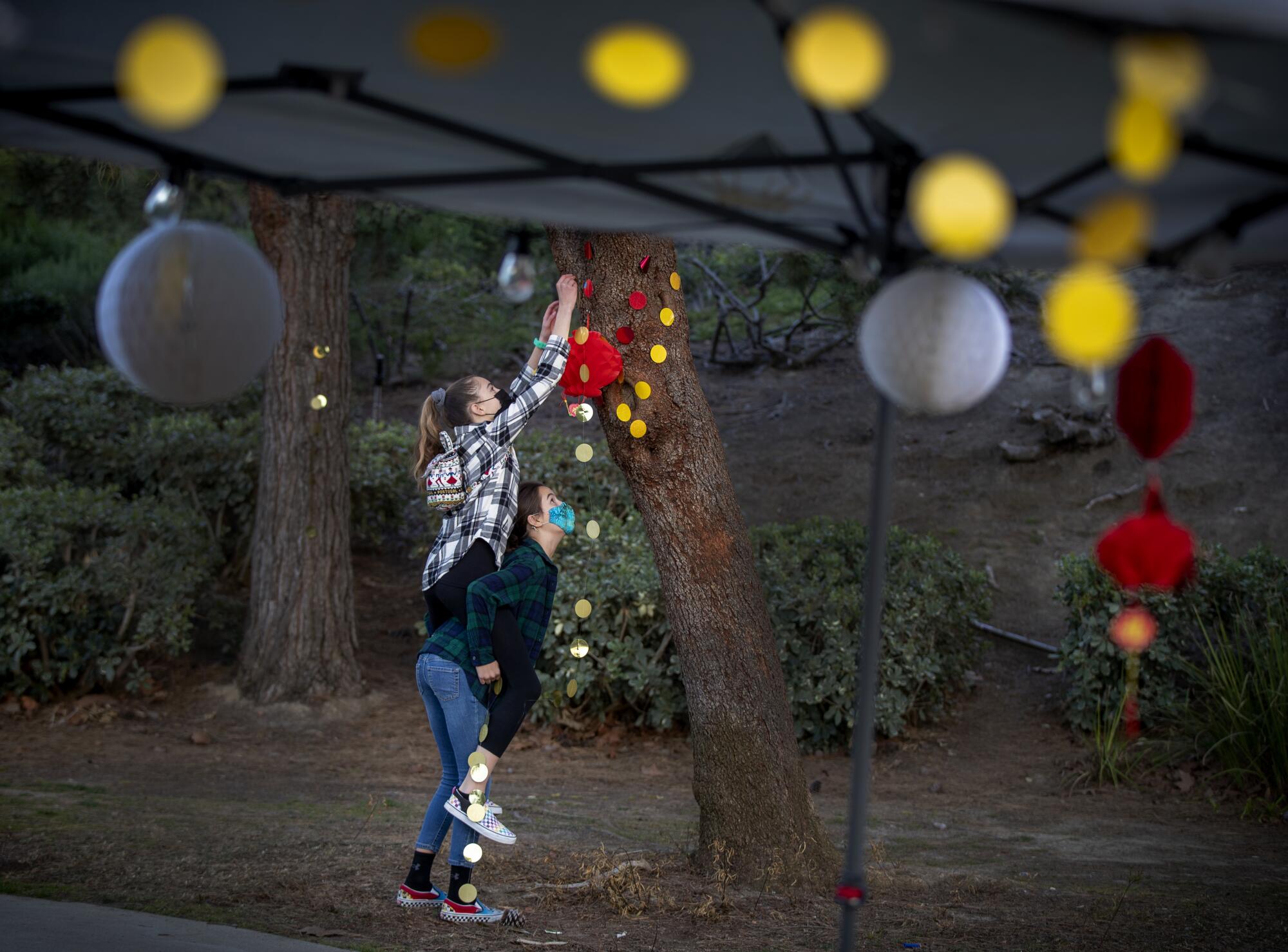
Parks, who takes daily walks around the neighborhood, had introduced herself to Si and his family when she noticed them moving in last year.
In early February, Si reached out to Parks for advice.
He had already told her about the constant doorbell ringing, and she had offered to help if needed.
At first, she figured it was a harmless childhood prank of “ding-dong ditch.”
But as the harassment continued, including racial slurs against the family, Parks realized this was something uglier.
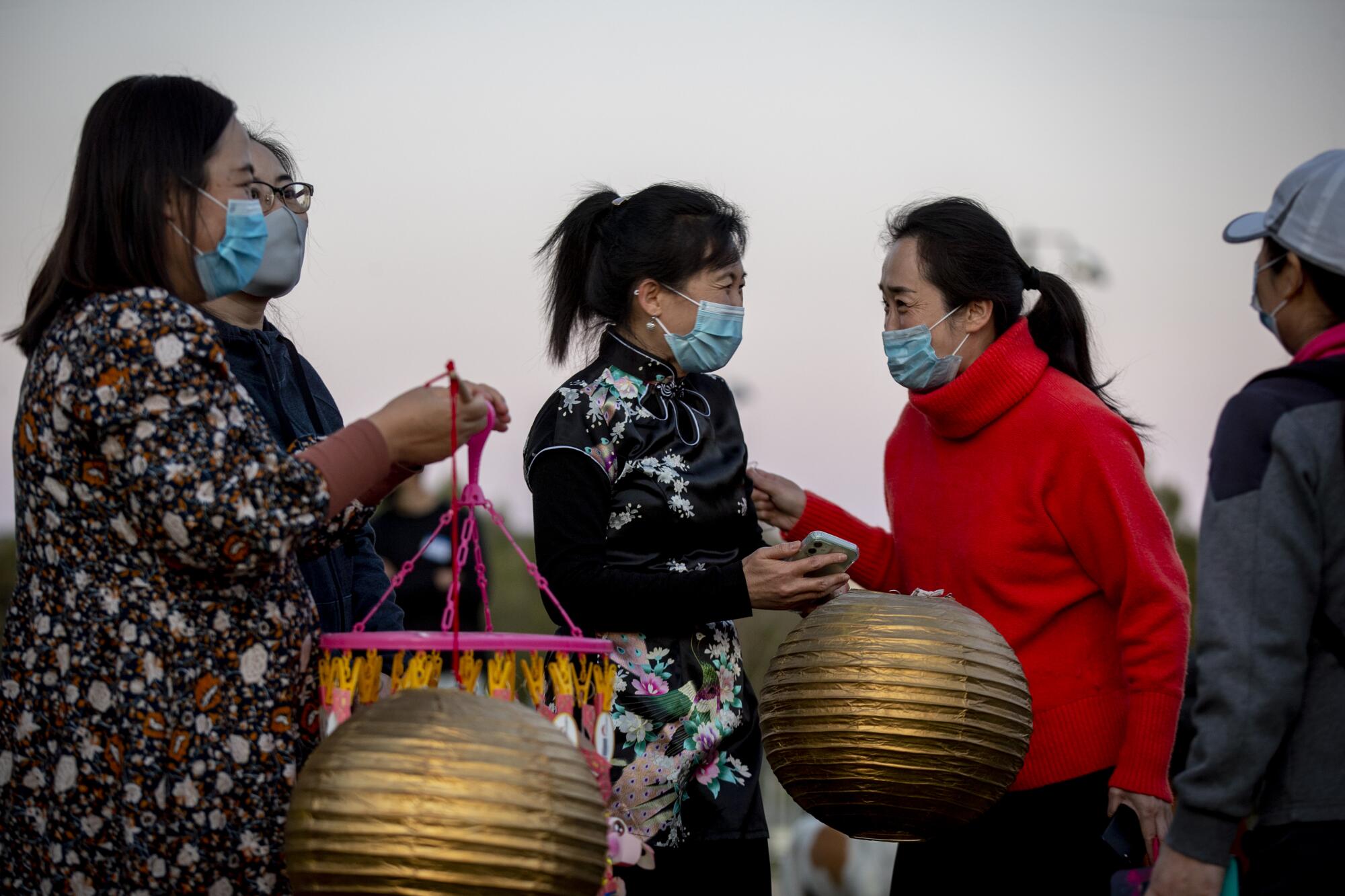
“It makes me physically ill,” said Parks, 30. “This has opened my eyes to the racism that is alive and well in Ladera Ranch. It’s definitely made me sad for this community, because this is just a wonderful place full of friends and neighbors that love and care about each other.”
On a neighborhood Facebook group, Parks posted footage from Si of a recent attack and sought volunteers to guard the family’s home. She wanted coverage from 6 p.m. until at least midnight.
Neighbors signed up in droves.
“I got involved because I’m raising a young child here. I don’t want to put a ‘for sale’ sign in front of my house and say, ‘I can’t deal with this,’” said Emily Lippincott, 40, who lives nearby in Rancho Mission Viejo. “I kept seeing excuses being made, ‘Oh, it’s just kids being kids.’ No, this is months of terrorizing this poor family.”
Neighbors estimate that from 15 to 20 children have participated in the harassment, one as young as 10.
Three children have apologized, Si said. But Parks said one family sent a cease-and-desist letter after seeing their child in security footage she posted on Facebook. The letter threatened her with a lawsuit if she didn’t remove her post.
As the sun began to set on a recent Thursday, Parks stood outside the Sis’ home, where Loden Pass curves onto Mocha Lane, assembling her troops. She kept close watch on a cluster of teenagers riding bicycles on the trails on a hillside overlooking the home.
“This is what we do all night,” Parks said. “We see kids and we go ‘OK, are they good or are they bad?’ Are they coming this way?”
Two neighbors bundled up in coats to ward off the evening chill, grabbed flashlights and took their posts on top of the hill near the home. Others stationed themselves around the neighborhood.
“I’m so thankful for my neighbors,” Si said.
In the two weeks or so since the volunteers have been protecting the home, the harassment has lessened, but the teens haven’t been completely deterred.
One evening, a group threw rocks at Si and volunteers who were chatting on the front lawn. Sometimes they yell profanities, neighbors said.
The next day, as Chinese families around the world celebrated the Lantern Festival, hundreds of residents gathered on the grassy lawn across the street to show their support.
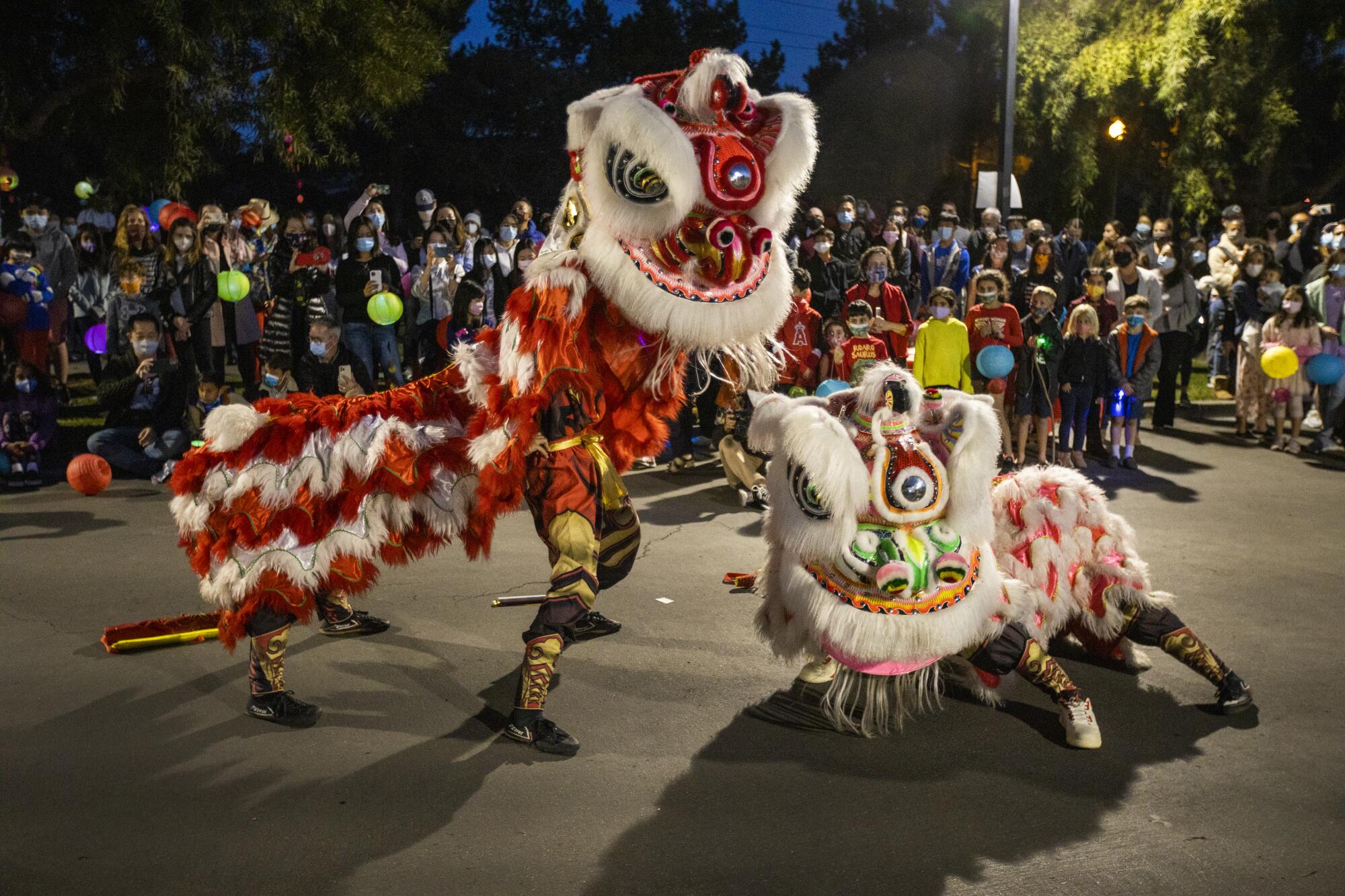
People held red lanterns and watched a traditional lion dance performance. Young children danced and clapped along to the music.
Min, the state senator, said the Si family should not have been made to feel unsafe and unwelcome in their own home.
“The fact of the matter is — as we see tonight — we outnumber them,” Min told the crowd.
More to Read
Sign up for Essential California
The most important California stories and recommendations in your inbox every morning.
You may occasionally receive promotional content from the Los Angeles Times.
